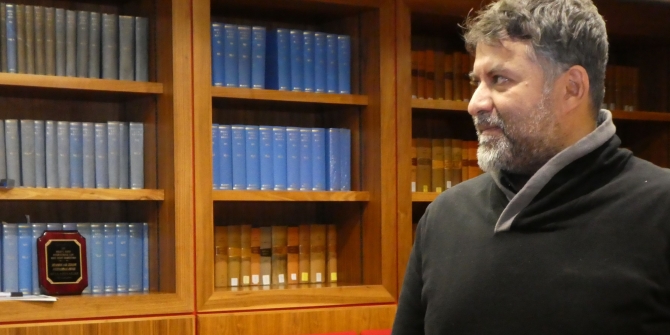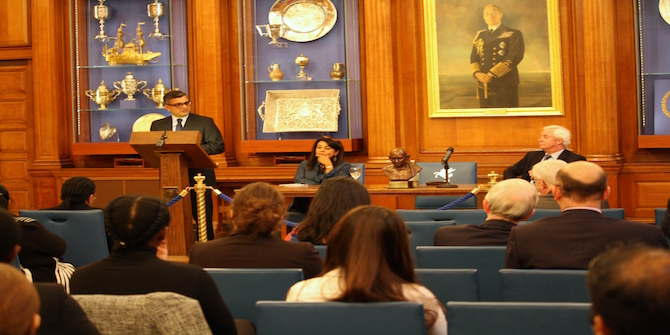Ashok Desai (1932-2020) graduated from LSE in 1956 with a BSc in Economics. Here Mariam Faruqi (South Asia Regional Director, iProbono) remembers his impressive legal career and his long-standing commitment to pro bono legal work.
Lawyers across the world are familiar with the pressure of billable hours and the need to account for every minute of time. As a lawyer, you are what you earn and who your clients are. Familiar too is the occasional case taken on for free in the public interest or pro bono. Ashok Desai, former Attorney General of India and LSE alumnus (BSc Economics, 1956) who died on 13 April 2020, was more than familiar with the idea of occasional pro bono work, something he demonstrated by working on the landmark Salwa Judum case for 12 years pro bono. When someone breaks the mould we remember them.
In the Salwa Judum case, the Supreme Court of India argued that the mobilisation and deployment of tribal youth as Special Police Officers ordered by the State government between 2005-11 in their fight against the Maoist insurgency was illegal and unconstitutional.

The court ordered that they disband. In The Burning Forest, an account of the insurgency written by Nandini Sunder, the author recounts the human toll and rights violations committed by this state-sponsored militia in Chhattisgarh. In the book, the author remembers Ashok Desai’s office in the basement of his home, the commitment of his legal team to the case, and his “steady fund of funny anecdotes, wide reading and keen interest in everything around him”. Known affectionately as Ashokbhai by his juniors, Ashok combined a lucrative legal practice with a commitment to ensuring justice for all and giving back to society by fighting cases for free.
Born in December 1932, the son of a criminal lawyer, Ashokbhai completed his LLB at Government Law College Bombay before joining the London School of Economics and Political Science to pursue a BSc in Economics. He was called to the Bar at Lincolns Inn in 1956 and returned to India that year to start a legal career at the Bombay High Court. Here he earned a reputation as a fierce advocate of civil liberties, and at the same time building a thriving commercial practice. Broader interests took him to the Times of India from 1963-69 as their legal correspondent and to later teaching law. But it was his return to legal practice where he made his mark.
In Sakharam Binder, a Marathi play written by Vijay Tendulkar, the protagonist is a bookbinder who “takes in” Champa and Laxmi women seemingly discarded by their husbands. Complex themes of patriarchy, gender violence and poverty inform the plot as Sakharam uses the women for sex and domestic chores on the pretext of saving them. The play, first performed in 1972, was censored on the grounds of obscenity under the Bombay Police Act 1951. Ashokbhai represented Tendulkar and the Bombay theatre against a series of petitioners including the police and Stage Performance Scrutiny Board. Arguing successfully in favour of freedom of expression, he ensured the court order was struck down by, what Ashokbhai referred to as the ‘unguided and unconstitutional’ sections of the Act. Tendulkar’s play is still regularly performed today.
Through the Emergency (1975-77) Ashokbhai took on a number of pro bono cases to defend civil liberties and challenge abuses of power; by the end of the crisis in 1977 he was designated Senior Advocate. A self-confessed highlight of his professional life was the case against Abdul Rehman Anatulay, Chief Minister of Maharashtra, who was found guilty of corruption and misuse of office. It is one of the first examples of a court order leading to a ministerial resignation.
Ashokbhai went on to become Solicitor General of India (1989-90), Attorney General (1996-98) and was honoured with a Padmabhushan in 2001.
When s377 of the Indian Penal Code was declared unconstitutional, the legal community raised their hats to the pro bono lawyers committed to the case. Ashokbhai was one of them, alongside Anand Grover, Menaka Guruswamy and Krishnan Venugopal to name a few. He argued on behalf of LGBT+ groups and their allies asserting that “the law created utter chaos” and homosexuality was not alien to Indian culture. That same year a leading legal publication described him as the “reclusive former AG (Attorney General), softly-spoken but packing a serious punch and control”.
Ashokbhai passed away in Mumbai early this month. In an obituary, Indira Jaising, his friend, senior advocate and human rights activist recalls that “in the last few years of his life he was seen in courts only when appearing in pro bono cases”. We can only speculate as to the roots of his contribution to social justice and the pro bono spirit within the legal profession; was it his life long commitment to the teachings of Buddhism or an innate belief that you have to give back to society? Either way, his outstanding legal career as a fierce advocate of civil liberties will be studied for many years to come, and his commitment to offering his legal services for free will not be forgotten.
This article gives the views of the author, and not the position of the South Asia @ LSE blog, nor of the London School of Economics. Image used within article: Ashok H Desai. Credit: CC BY-SA 4.0, Creative Commons. Featured image: Hammer and Books. Credit: Succo, Pixabay.







